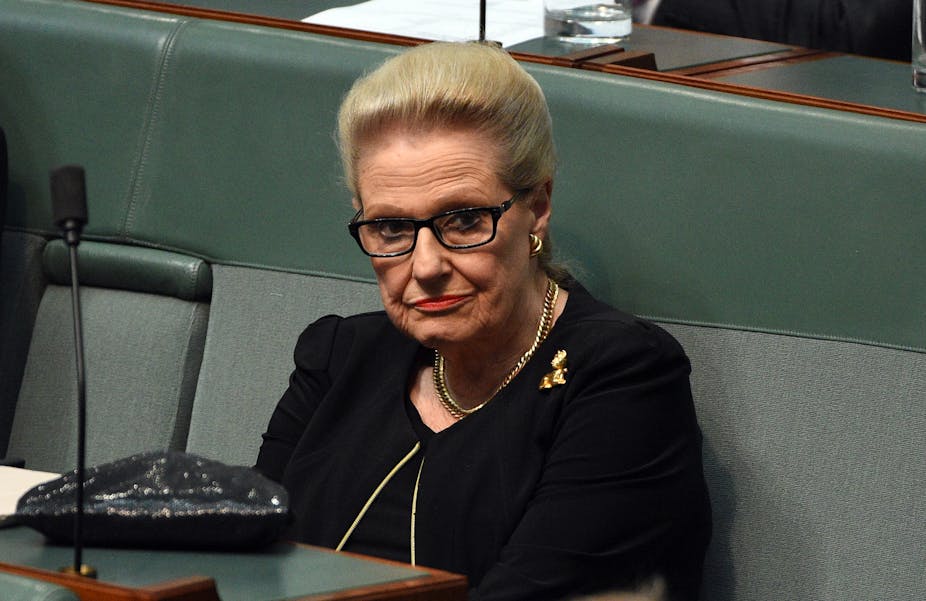The government has indicated it will adopt the recommendations of a review of parliamentarian entitlements that was released on Wednesday.
Former prime minister Tony Abbott instigated the review following the resignation of Bronwyn Bishop from the speakership over her extravagant entitlement claims. These claims included Bishop’s controversial helicopter trip from Melbourne to Geelong to attend a party fundraiser.
How does the entitlements system work?
The current entitlements system for MPs is a complex mix of legislation, regulations, Remuneration Tribunal determinations, executive determinations and non-binding procedural rules.
Under current legislation, MPs can claim the cost of first-class flights, official cars and approved special-purpose aircraft for travel within Australia. MPs can also claim overseas travel costs with prime ministerial approval.
These entitlements are limited to travel relating to parliamentary or electorate business. Ministers are able to claim additional travel costs for their spouse with prime ministerial approval.
Under “family reunion” benefits, MPs’ spouses and dependants may join them within Australia several times a year. MPs can also claim five return business-class trips to Canberra within six months of retirement.
The Finance Department issues reports on entitlement claims by current and former MPs and their spouses every six months.
When there is an allegation of misuse of entitlements, a protocol allows the Finance Department to conduct audits on these allegations. The department can refer serious allegations to the police. The protocol is not legally enforceable and can be revoked at any time.
There are problems with the current entitlements system. Breaches are investigated completely within the executive under a veil of secrecy, without independent oversight. There are no legally enforceable ways to make MPs repay any misuse of entitlements. It is a complex system, which makes it difficult for MPs to work out what their entitlements are.
What does the review recommend?
The panel made 36 recommendations. It adopted a principles-based approach that gives MPs the flexibility to use their judgement, but obliges them to be audited and to report publicly.
The review recommended changing the terminology of “entitlements” to “work expenses”. This is because MPs are given resources to perform their duties in exchange for acting in the public interest.
Parliamentary expenses are to be consolidated into a single piece of legislation. Claims are to be limited to those for the dominant purpose of conducting parliamentary business. This excludes political party administration and management, and activities for the dominant purpose of party fundraising, pursuing commercial interests or obtaining personal benefit.
The review also recommended that the COMCAR system, which transports politicians in private cars, be reviewed to achieve better “value for money”. An allowance of A$10 per night for spouses accompanying ministers on travel will be abolished.
The “family reunion” and post-retirement travel benefits will be reduced. The report also suggested banning short trips by helicopter without compelling reasons.
The review recommended more frequent reporting to improve transparency. MPs must lodge their expenses within 30 days, rather than 60 days. The Finance Department must publish these expenses monthly, instead of every six months.
The review also suggested enhancements to the accountability framework. For more serious allegations, membership of the investigation committee must include two independent members, with one being a retired judge. But the Finance Department is still responsible for overseeing the system.
The legal enforcement of the system will be increased. Where parliamentarians misuse entitlements, legislation will oblige them to repay the money – plus a 25% penalty.
Will this fix the system?
The review found that the entitlements system was:
… complex, confusing, incomplete, contradictory and immensely difficult to follow and administer.
Such complexity could lead to inadvertent, perceived or deliberate breaches by MPs. These breaches may undermine public confidence in MPs.
When implemented, the recommendations will significantly improve the entitlements system. The reforms will simplify the system, enhance transparency, tighten the rules and introduce enforceable penalties.
The report also enhances the oversight framework. It inserts two independent members for serious allegations.
But there are more independent oversight models. In the UK, the Independent Parliamentary Standards Authority oversees parliamentary expenses. This body is completely independent of the executive and has significant resources.
As holders of public office, we expect politicians to use taxpayer funds responsibly. To achieve this, we need an entitlements system that is transparent, with claims reported regularly and publicly. We should have an independent authority actively monitoring claims and vigilantly enforcing breaches.
This will keep politicians more honest, in line with public expectations. It is only with a robust entitlements system that “Choppergate” will not be repeated.

